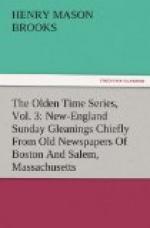Paine, Thomas 49, 56 Parker, Mr. 10 Peele, Willard 46, 48 Peters, Hugh 9 Phillips, Stephen C. 43, 46 Pickman, Dudley L. 46, 48 Pingree, David 43 Preston, Mr. 65 Prince, Rev. John, LL.D. 21 Putnam, Perley 43, 46, 48
Saltonstall, Leverett 43 Smith, Jonathan 15 Smith, Susan 15 Spurgeon, Rev, C.H. 6 Stearns, Charles 21 Story, Franklin H. 43 Swan, Mr. 10
Talmage, Rev. Dr. 6 Treadwell, John W. 43 Trumbull, Jonathan 15 Tucker, Gideon 46, 48
Vose, Mr. 34
W——, Rev. Mr. 41 Washington, George 1 Waters, Joseph G. 43 Waters, Stanley 10 West, Nathaniel, Jr. 43 White, Stephen 46 Whiting, Samuel 32 Wright, Fanny 56
[Illustration]
New-England Sunday.
Seeing in an old paper that General Washington was stopped by a “tythingman” in Connecticut in 1789 for the “crime” of riding on Sunday, we were naturally led to think about the “Sabbath question,” as it is sometimes called. We find the account referred to in the “Columbian Centinel” for December, 1789.
The PRESIDENT and the TYTHINGMAN.
The President, on his return to New-York from his late tour, through Connecticut, having missed his way on Saturday, was obliged to ride a few miles on Sunday morning, in order to gain the town, at which he had previously proposed to have attended divine service.—Before he arrived, however, he was met by a Tythingman, who commanding him to stop, demanded the occasion of his riding; and it was not until the President had informed him of every circumstance, and promised to go no further than the town intended, that the Tythingman would permit him to proceed on his journey.
* * * * *
This Sunday question has been so often discussed of late years, and the opinions expressed on the same are so diverse, that it may be well to print a few selections on the subject from some of the old newspapers, that those who are interested may see, as a matter of curiosity, if for no other reason, what views have been entertained within the past century, more especially in New England, in reference to Sunday.
In a Salem paper of 1775 the following notice appeared:—
WHEREAS the sober and thoughtful People of this Town are much displeased by the great Noise and Disturbance made in the Streets, on Saturday and Sabbath Day Evenings. It is earnestly desired that all Heads of Families would keep their Children and Servants at Home, on those Evenings, and thereby greatly contribute to the Quiet of the Town and Peace of the Inhabitants.
The appearance of Essex Street in Salem at the present time on Saturday evening would seem to indicate that “heads of families” do not now “keep their children and servants at home.”




